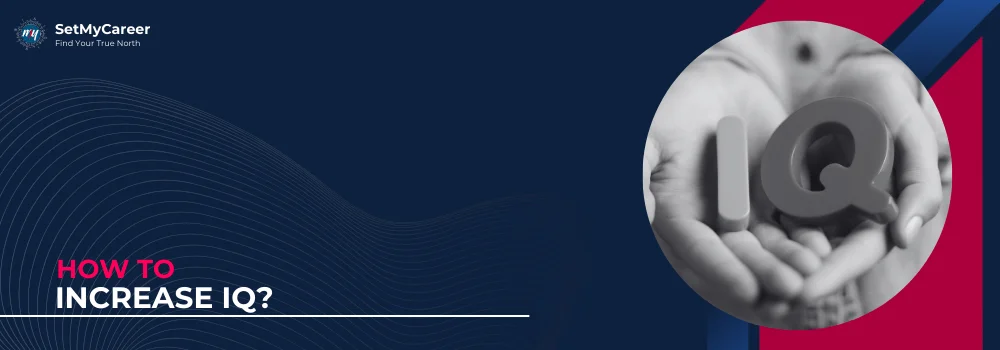
Published by Dr. Nandkishore Rathi on 3 April 2025
Chief Career Navigator
Dr. Nandkishore Rathi is passionate about identifying people's passions and helping them create and lead successful and fulfilling careers. With 30+ years of experience and interactions with thousands of students, academicians, and corporate executives, he has developed a range of career services aimed at benefiting individuals seeking a breakthrough in their professional lives.
Train Your Brain! This blog is your foolproof guide to up your smarts with simple and effective ways to boost your IQ.

Intelligence is often seen as a fixed trait—something you’re born with. But the reality is far more exciting. If you catch yourself thinking, “How can I become the best version of myself?”, you can start by upping your IQ game. While genetics do play a role, research suggests that IQ isn’t set in stone. Just like a muscle, your brain can be trained, challenged, and strengthened over time. By adopting the right habits, you can boost your cognitive abilities, improve problem-solving skills, and enhance overall intelligence. Through this blog, let’s dive into the smarts behind your IQ and the smart way to build it.
IQ, or Intelligence Quotient, is a measure of cognitive ability based on standardized tests. However, it’s important to understand what IQ represents and what it doesn’t:
What IQ Measures: Logical reasoning, problem-solving, spatial awareness, working memory, and processing speed.
What IQ Doesn’t Measure: Creativity, emotional intelligence, social skills, or wisdom.
Not a Fixed Score: While IQ tests provide a numerical score, intelligence is dynamic and can be improved through learning and experience.
Your brain is not a static organ—it is capable of change, growth, and adaptation. This phenomenon, known as neuroplasticity, means that new connections between neurons can form throughout life, especially when you challenge your brain with new activities and learning experiences.
Fluid vs. Crystallized Intelligence: Fluid intelligence refers to problem-solving and abstract thinking, while crystallized intelligence involves accumulated knowledge and experience. Both can be improved with practice.
Studies on Brain Plasticity: Research has shown that activities like learning new skills, exercising, and engaging in complex problem-solving can strengthen brain function.
Environmental Factors: A stimulating environment, curiosity, and an active learning approach contribute significantly to IQ growth.
Your brain is not a static organ—it is capable of change, growth, and adaptation. This phenomenon, known as neuroplasticity, means that new connections between neurons can form throughout life, especially when you challenge your brain with new activities and learning experiences.
Fluid vs. Crystallized Intelligence: Fluid intelligence refers to problem-solving and abstract thinking, while crystallized intelligence involves accumulated knowledge and experience. Both can be improved with practice.
Studies on Brain Plasticity: Research has shown that activities like learning new skills, exercising, and engaging in complex problem-solving can strengthen brain function.
Environmental Factors: A stimulating environment, curiosity, and an active learning approach contribute significantly to IQ growth.

Find your personalized guide to boost IQ for better career opportunities.
Get SmarterIQ is not equally malleable at all stages of life. Understanding how intelligence develops can help in optimizing learning efforts:
Early Childhood (0-6 years): This is the most critical period for brain development. Neural connections form rapidly, and experiences during this time have a profound impact on cognitive abilities. Factors like nutrition, exposure to language, and problem-solving activities play a crucial role.
Adolescence (7-18 years): The brain remains highly plastic, and structured learning, critical thinking exercises, and skill development can significantly influence intelligence. However, certain cognitive abilities, like working memory, start to stabilize.
Adulthood (19-40 years): While learning remains possible, fluid intelligence (problem-solving and quick thinking) starts to peak and may decline slightly with age. However, crystallized intelligence (knowledge and expertise) continues to grow.
Middle Age and Beyond (40+ years): Cognitive decline can begin if the brain isn’t regularly challenged. However, activities like learning new languages, practicing memory techniques, and staying socially engaged can slow this process and even enhance intelligence in certain areas.
Now, let’s look at how to motivate yourself. Understand that while intelligence has genetic components, lifestyle choices and habits play a crucial role in enhancing cognitive function. Here are some practical and science-backed ways to increase your IQ:
Train Your Brain with Cognitive Exercises: Your brain thrives on challenges. Engaging in mentally stimulating activities strengthens neural connections and enhances cognitive flexibility. Try:
Puzzles and Games: Sudoku, crossword puzzles, and chess enhance problem-solving and analytical thinking.
Memory Training: Techniques like the method of loci (memory palace) and chunking improve recall and retention.
Mental Math: Practicing calculations without a calculator sharpens numerical reasoning and working memory.
Read Widely and Deeply: Reading exposes you to new ideas, perspectives, and ways of thinking. Diversifying your reading material stimulates intellectual growth:
Learn a New Skill or Language: Mastering a new skill requires your brain to form new neural pathways, making you more adaptable and intelligent. Some impactful skills include:
Learning a Foreign Language: cognitive flexibility and memory.
Playing a Musical Instrument: Improves pattern recognition, coordination, and mathematical abilities.
Coding and Logical Thinking: Boosts problem-solving skills and structured thinking.
The Role of Social Interaction in Intelligence: Social interactions play a crucial role in cognitive development. Engaging in deep discussions, debates, and problem-solving sessions challenges your mind and enhances reasoning abilities.
Debating Different Perspectives: Engages logic and reasoning skills.
Networking and Learning from Experts: Surrounding yourself with knowledgeable people can boost intellectual growth.
Group Brainstorming Sessions: Encourages creative problem-solving and idea generation.
Prioritize Physical Exercise: Physical activity isn’t just good for the body—it’s essential for brain health. Exercise increases blood flow to the brain, improving focus, memory, and cognitive function. The best exercises for mental enhancement include:
Aerobic Exercises (Running, Swimming, Cycling): Boosts brain-derived neurotrophic factor (BDNF), which supports neuron growth.
Strength Training: Enhances executive function and memory.
Yoga and Meditation: Improves concentration and reduces stress, which can hinder cognitive performance.
The Power of Mindfulness and Meditation: Mindfulness and meditation are scientifically proven to enhance brain function, improving focus, memory, and emotional regulation.
Increases Gray Matter: Studies show that meditation increases gray matter in areas related to learning and memory.
Reduces Stress: Lower stress levels lead to better cognitive function.
Improves Attention Span: Practicing mindfulness helps with sustained focus and better information retention.
Get Quality Sleep: Sleep isn’t just rest—it’s when your brain consolidates information and strengthens neural pathways. Adult brains need a minimum if 8-9 hours of sleep a day for peak functioning. To maximize brain function:
Stick to a Schedule: Sleep and wake up at the same time every day.
Avoid Blue Light Before Bed: Screens disrupt melatonin production and impair sleep quality.
Take Power Naps: Short naps (10–20 minutes) can improve memory and cognitive function.
Eat Brain-Boosting Foods: Your diet has a direct impact on cognitive abilities. To fuel your brain effectively, include:
Healthy Fats: Avocados, nuts, and olive oil support brain function.
Omega-3s: Found in fatty fish like salmon, these improve memory and learning.
Antioxidants: Dark chocolate, berries, and green tea protect against cognitive decline.
Complex Carbohydrates: Whole grains provide steady energy for mental performance.
Intelligence-building strategies shouldn’t just be an afterthought—they should be deeply ingrained in early development. Schools and parents play a crucial role in fostering curiosity, problem-solving skills, and continuous learning from an early age. Implementing initiatives like Genius Hour, where students explore self-driven projects, can spark creativity and critical thinking. By emphasizing these cognitive-enhancing techniques at home and in the classroom, we can equip students with the skills they need for career success, innovation, and adaptability in an ever-changing world.
Increasing your IQ isn’t about overnight miracles—it’s about consistent mental stimulation, healthy habits, and a thirst for knowledge. It is a journey, not a destination. By training your brain, challenging your thinking, and adopting a lifestyle that supports cognitive function, you can sharpen your intelligence and thrive in any intellectual pursuit. Discover the cheat codes on how to achieve success in life. Start small, stay curious, and watch your mind expand beyond limits you once thought possible.
No. 14/595, 1st Floor, Nanjappa Reddy Layout, Koramangala 8th Block, Bangalore 560095